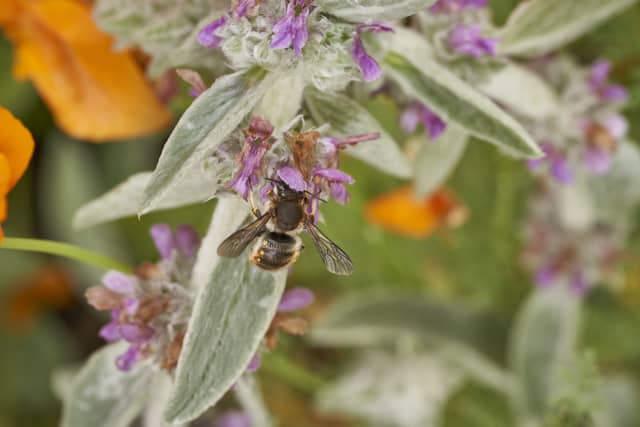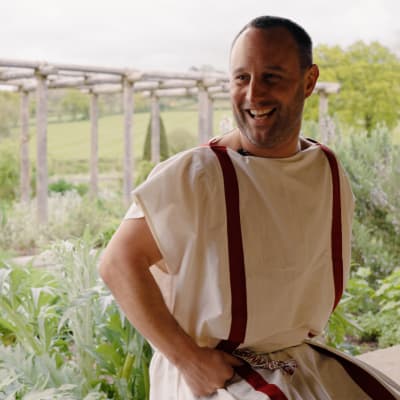Summer in Somerset is Newt Entomologist Thomas Oliver’s busiest time of year. We talk previously extinct species, survey tactics and saving shrill carder bees with our in-house insect expert

Our first full-time resident entomologist, Thomas Oliver has been hooked on the weird and wonderful world of insects all his life. “I started getting into insects thanks to my grandparents, who I lived next door to,” explains Tom. “They were beekeepers for 50 years.” He received his first hive on his 14th birthday, which was the perfect introduction to bees, insects and wildlife.
Tom spent 10 years beekeeping, tending to hives on rooftops, and appearing on ITV1’s This Morning, before going onto a master’s degree and PhD in bumblebees. His passion lies with wild bees and pollinators, which is why the idea of being outside on the job and The Newt’s natural beekeeping methods appealed.

Bringing the Buzz
“The way that I describe entomology to people who talk to me in the gardens, is that anything with six legs is my responsibility,” says Tom. “The main remit is less entomology and more ecology, to find out about everything that’s here on the estate.”
Tom’s big focus for the year is a biodiversity audit across the Kitchen Garden, Parabola and wildflower meadow to discover which spineless wonders, and life generally, is flourishing on the estate. His survey tactics are already drawing much interest from guests and members.
“Surveys use a number of different techniques involving what's called 'pitfall traps' as well as using a net,” explains Tom. “I'm out there catching butterflies and whatever else is flying around. I use a beating tray - which is like a flat net - to beat a tree or bush and whatever falls onto the tray, I can record." Other methods include direct visual observations and Tom's not averse to getting on his hands and knees to dig through leaf litter and dirt.
He's also expanding his horizons to amphibians, working on our annual Great Crested Newt Survey, and collaborating with wildlife groups and volunteers to record birds, mammals and reptiles on the estate.
Surprising Discoveries
Each day is different, and Tom’s already laid claim to spotting a species believed to be extinct in Somerset, thanks to a tip off from an entomology friend in Kent. “I found a species of fly, which is a stem-mining fly, particularly in blackthorn branches,” he says. “They hadn't been found in the UK since the 1950s, and I had the first record in Somerset over at Avalon Farm.” You can watch our video on his recent discovery, here.
Other responsibilities, particularly during winter, include pest management as part of our bio control programme. “We’re bringing in insects that eat our pest insects indoors, instead of using chemicals,” explains Tom. He’s also involved in bee safaris and beekeeping workshops during the summer months, with plans afoot for biodiversity workshops and the importance of gardening for wildlife in the pipeline.
Tom loves the collaborative nature of the job, which is a world away from what he’s used to. “There are always opportunities to go and do things,” he enthuses. “Yesterday, I went to Exmoor National Park, thanks to one of the gardeners who had a good connection with the rangers there, and I was able to go out and learn some butterfly larvae ID skills.”

Save our Shrills (SOS)
Getting involved in conservation projects will ensure a rich diversity of species on the estate. Tom recently invited the Bumblebee Conservation Trust, who are working on a project in Somerset called ‘Save the Shrill Carder’ (SOS), which is the rarest - and one of the smallest - bumblebees in the UK.
“There have been a few sightings in Somerset over the last 10 years,” he says. “The Trust is encouraging land owners in the county to provide habitats for the bees and I’m hoping to encourage them this year too. They like long, tufty grass to be able to hibernate and make their nests. They come out quite late compared to other bumblebees, usually during May and June, so we want to make sure there are areas where the grass isn’t cut until very late."
While Tom describes this year as a ‘pilot’ in the grand scheme, the data from his learnings will inform our conservation programmes at The Newt, ultimately protecting and promoting essential biodiversity.
There’ll be much to see and identify as the weather warms, such as Emperor Dragonfly larvae emerging from the ponds. Be sure to follow along on our social channels @thenewtinsomerset to keep up with all the latest finds.




